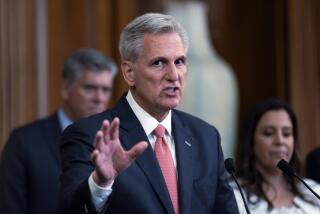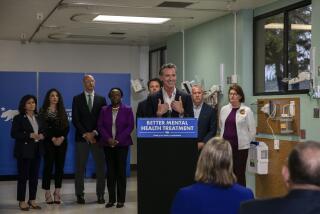Debt ceiling do-or-die
Last week’s sour news about unemployment prompted calls for the government to do more to boost the economy. Unfortunately, history shows that there’s no magic wand Washington can wave to put people quickly back to work. What it can do is calm some of the anxieties investors have about the future — in particular, the nervousness about the government’s fiscal health.
The news on that front isn’t very good either. Washington has hit the statutory limit on borrowing, and Moody’s Investor Services warned Thursday that it might downgrade the United States’ credit rating if lawmakers can’t agree soon to raise the debt ceiling. Such a move could take a painful toll on Washington and many other borrowers.
Meanwhile, negotiators for the two parties seem far apart on a debt-limit deal that would also slash projected deficits. Democrats demand that any plan include raising tax revenue by winnowing the thicket of deductions, exemptions and credits in the tax code. Republicans insist that taxes are off the table and that lawmakers must significantly slow the growth in Medicare and Medicaid spending.
Republicans are right that Washington’s long-term fiscal problems cannot be fixed without addressing the spiraling growth in healthcare costs. But it’s quixotic at best to think that congressional leaders could overhaul Medicare and Medicaid in a few weeks of closed-door meetings.
Leaving taxes out of the deficit-reduction equation is a mistake too. The country is undergoing a profound demographic shift, with the number of retirees dependent on federal programs growing faster than the ranks of young people entering the workforce to help pay for those programs. That’s why groups from both sides of the political spectrum have recommended that, in addition to scaling back federal benefit programs and shrinking the Pentagon and other federal departments, Washington eliminate tax breaks to enable a higher level of spending than in previous decades.
The sharp division between the two parties over how to solve Washington’s long-term fiscal problems mirrors the lack of public consensus on what to cut and what to keep. That consensus may not emerge until after the next election, when competing plans for solving Washington’s fiscal problems are expected to take center stage. In the meantime, however, Congress has to raise the debt ceiling. The long-term solution has to take a back seat to the country’s vital interest in avoiding default.
More to Read
A cure for the common opinion
Get thought-provoking perspectives with our weekly newsletter.
You may occasionally receive promotional content from the Los Angeles Times.










